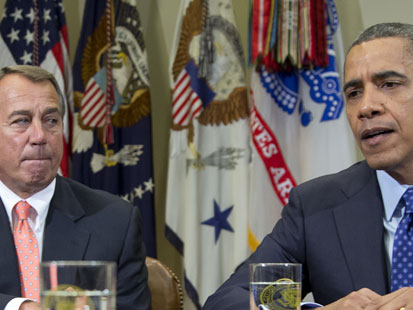CAIRO (Reuters) - Protests by Islamists allied to President Mohamed Mursi forced Egypt's highest court to postpone a session set to examine cases that could further complicate the country's political crisis.
The Supreme Constitutional Court did not say when it would reschedule hearings in cases examining both the legality of the upper house of parliament and the assembly that drafted the new constitution, both bodies dominated by Islamists.
The cases add uncertainty to the crisis ignited by a November 22 decree that temporarily expanded Mursi's powers, triggering countrywide protests and violence that has deepened the rift between newly empowered Islamists and their opponents.
Three people have been killed and hundreds injured. The wave of street protests continued on Saturday with a protest by at least 200,000 Mursi supporters at Cairo University. Mursi's opponents are staging an open-ended sit-in in Cairo's Tahrir Square, the cradle of the uprising that toppled Hosni Mubarak.
Mursi and the Muslim Brotherhood which propelled him to power in a June election hope to end the crisis by passing the new constitution that that was wrapped up on Friday. Mursi received the constitution on Saturday and immediately called a December 15 referendum, urging all Egyptians to go out and vote.
"The Muslim Brotherhood is determined to go ahead with its own plans regardless of everybody else. There is no compromise on the horizon," said Hassan Nafaa, a professor of political science at Cairo University.
The constitution, he said, would likely be approved by a slim majority. "But in this case, how can you run a country with a disputed constitution - a constitution not adopted by consensus?" he said.
Outside the Supreme Constitutional Court, hundreds of Muslim Brotherhood supporters gathered through the night. "Yes to the constitution", declared a banner held aloft by one pro-Mursi protester. Chants demanded the "purging of the judiciary".
The protest reflected the deep suspicion harbored by Egypt's Islamists towards a court they see as a vestige of the Mubarak era. The same court ruled in June to dissolve the Muslim Brotherhood-led lower house of parliament.
Since then, an array of legal challenges have cast a shadow over both the upper house of parliament and the 100-member constituent assembly.
Cases against the upper house have focused on the legality of the law by which it was elected, while the constitutional assembly has faced a raft of court cases alleging that the way it was picked was illegal.
STOCK MARKET RALLIES
Mursi believes that securing approval for the new constitution in a popular referendum will bury all arguments on the legality of the constituent assembly or the controversy over the text it worked through the night to finish on Friday.
It will also override the controversial November 22 decree that triggered statements of concern from Western governments and a rebellion by sections of the judiciary that saw it as a threat to their role: the decree shielded Mursi from judicial oversight.
While the Islamists' critics including representatives of the Christian minority have accused the Brotherhood of trying to hijack the constitution, investors saw Mursi's moves as a harbinger of stability.
The main stock market index, which lost a tenth of its value in response to Mursi's November 22 decree, stood 2.6 percent higher after the market opened on Sunday.
"The events that took place through the weekend, from the approval of the final draft of the constitution and the president calling a referendum, gave some confidence to investors that political stability is on track," said Mohamed Radwan of Pharos Securities, an Egyptian brokerage.
But the political opposition made up of leftist, liberal and social parties have been infuriated by what they see as the Brotherhood's attempt to ram through a constitution that does not enjoy national consensus.
Mursi's opponents warn of deeper polarization ahead.
"LET EVERYONE HAVE THEIR SAY"
Leading opposition figure Mohamed ElBaradei said on Twitter that "struggle will continue". He said the draft constitution "undermines basic freedoms."
Liberal figures including former Arab League chief Amr Moussa pulled out of the constituent assembly last month, as did representatives of Egypt's Christian minority.
The draft constitution contains Islamist-flavored language which opponents say could be used to whittle away human rights and stifle criticism. It forbids blasphemy and "insults to any person", does not explicitly uphold women's rights and demands respect for "religion, traditions and family values".
The New York-based Human Rights Watch said it protected some rights while undermining others.
The text limits presidents to two four-year terms, requires parliamentary approval for their choice of prime minister, and introduces some civilian oversight of the military - although not enough for critics.
Mursi described it as a constitution that fulfilled the goals of the January 25, 2011 revolution that brought an end to Mubarak's rule. "Let everyone - those who agree and those who disagree - go to the referendum to have their say," he said.
The Islamists are gambling that they will be able to secure a "yes" vote by mobilizing their core support base and those ordinary Egyptians keen for an end to two years of turmoil that has taken a heavy toll on the economy.
(Writing by Tom Perry; Editing by Myra MacDonald)











